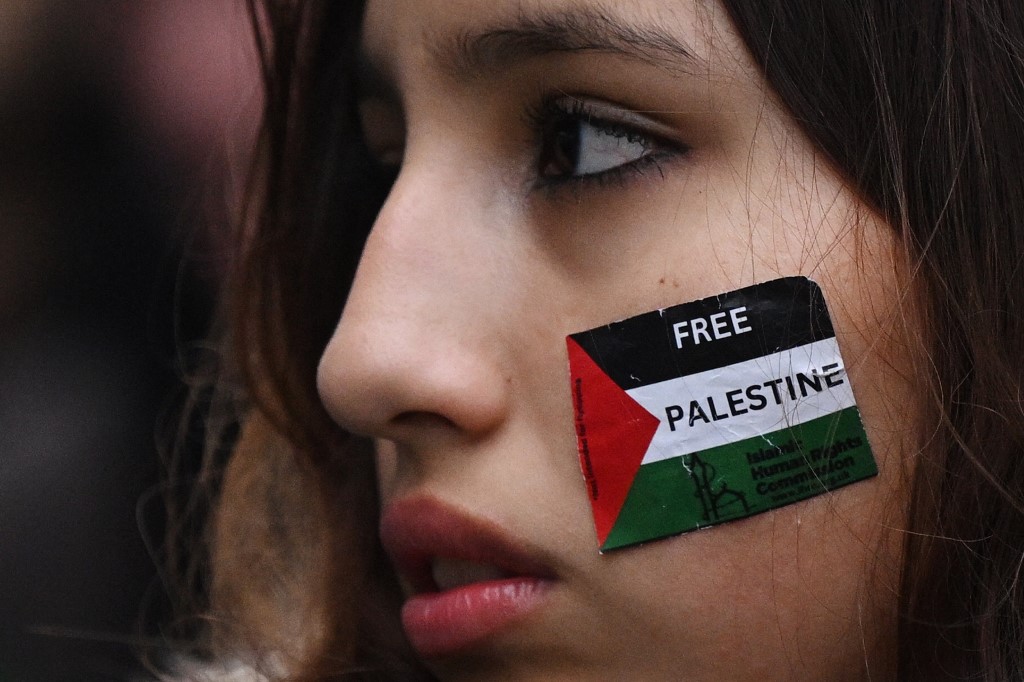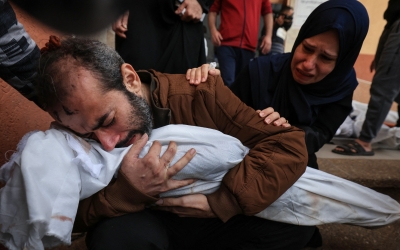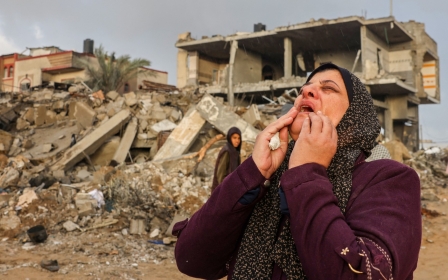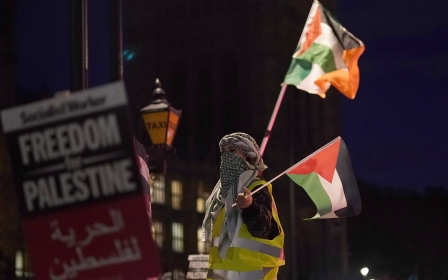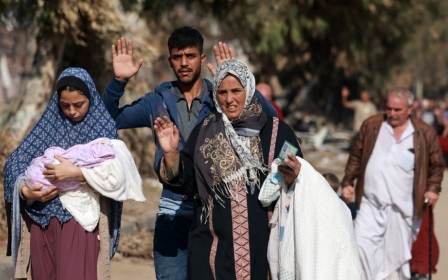Israel-Palestine war: Protests against the Gaza war could be a game changer
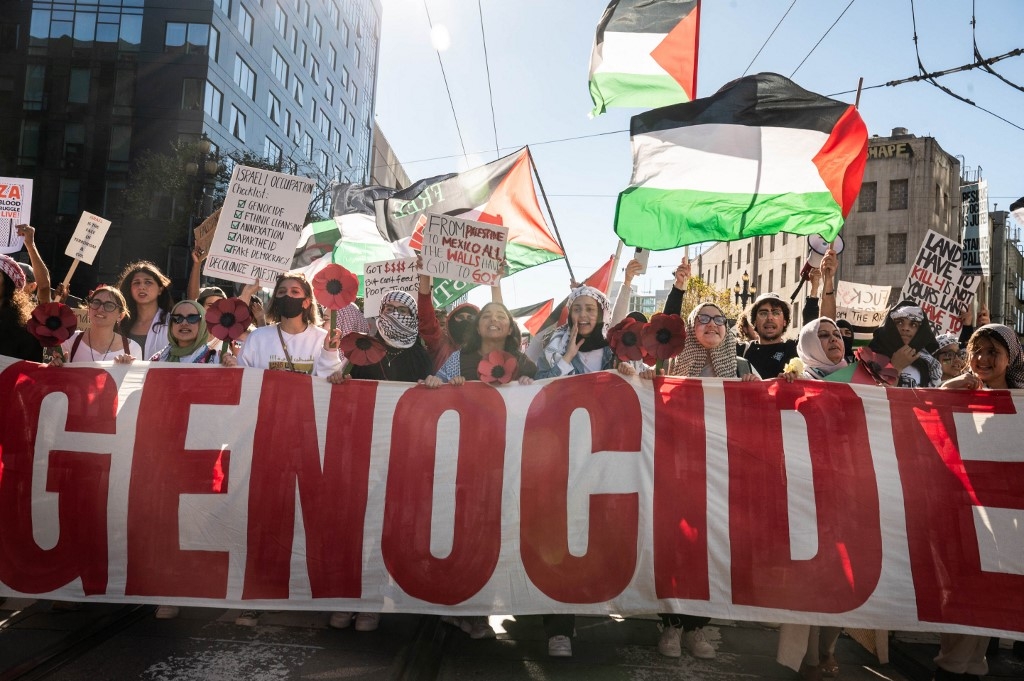
Nidaa Sisalem Aleman has not slept for weeks. As a British Palestinian from Gaza she has been trying desperately to help her 80-year-old mother and her sister get out of Gaza since the war began. Her husband’s family are also trapped there. Some have been killed.
I interviewed her on the edge of a “die-in” protest for Gaza in Brighton, where a hundred people or more lay down in the street covered in white sheets, accompanied by songs and poetry.
In Gaza, it is as if the previous day’s horror and atrocities are only a foretaste of the more heinous war crimes that the next day brings, carried out in darkness with an Israeli-imposed internet and power blackout, while the world watches.
“It’s terrible," says Nidaa. "I can’t speak to my family. Every morning I have to wake up very early to try to call them... they don’t have any internet or any landline, [the Israelis] cut it.”
Her mother, who suffers from kidney problems, lives in al-Sabra, in western Gaza. On 15 November, an Israeli air strike targeted and bombed Sabra mosque, killing at least 50 people. With intensive strikes in the area, Nidaa pushed her mother to go south. There was no taxi, so she had to walk.
New MEE newsletter: Jerusalem Dispatch
Sign up to get the latest insights and analysis on Israel-Palestine, alongside Turkey Unpacked and other MEE newsletters
“She walked six hours or more. She fell down twice because they shoot toward the people to scare them, shooting between their legs … [Israeli soldiers] were laughing when she falls, and if my sister goes to help, they shout, they don’t want anyone to help any person.
“If anyone carries food - bread, crisps for the children, chocolate, anything left in the house - they ask them to throw it away. My sister said that on the way south she found a lot of food on the floor, bread, biscuits. They are not allowed to eat anything during the walk.”
Her mother is now in Deir al-Balah, home to a British Commonwealth cemetery for Indian troops who fought for the British Empire against the Turks in the First World War.
'Since last Friday, maybe ten days, nobody helped them. No Red Cross, no United Nations, no ambulance. Three bodies [are] in the road'
- Nidaa Sisalem Aleman
A lot of Nidaa’s husband’s family have been killed while attempting to flee after Israel ordered them to leave. An elderly relative came out of her house with her disabled granddaughter and daughter-in-law, waving a white flag. The Israeli troops shot them, Nidaa says.
“Since last Friday, maybe 10 days, nobody helped them. No Red Cross, no United Nations, no ambulance. Three bodies [are still] in the road, and the rest they are injured.”
Those who have followed the wars in the Middle East since 2001 will have witnessed countless horrific attacks on civilians, from the second Gulf war, when millions watched as Baghdad was bombed by the US as if it were a shock and awe fireworks display, with thousands killed by US missiles, out of sight of the cameras. Then came the wars in Syria and Yemen. And now Gaza.
Global protests
Once again, it is our western governments that have endorsed and supported Israel’s war of annihilation. And like the invasion of Iraq 20 years before, millions have taken to the streets to protest against a war launched in their name.
Gaza is also a war of narratives, of governments against their people, with western corporate media attempting to hold a line in favour of Israel’s legitimacy while millions in western countries are increasingly seeing the scales fall from their eyes.
Global protests, including direct actions and sit-ins at major rail terminals from New York to London, are sweeping European and American cities
Last week, a group of 50 people drove onto the San Francisco-Oakland Bay Bridge during the morning rush hour and stopped their cars, throwing their car keys into the bay and blocking traffic for hours. “Fifteen protesters covered themselves in shrouds and laid down in front of vehicles to represent dead bodies in Gaza,” the New York Times reported.
Meanwhile, in Washington State on 7 November, hundreds of pro-Palestinian demonstrators rallied at the Port of Tacoma to block a military supply vessel they believe was carrying weapons from the United States to Israel.
“We want a ceasefire now. We want people to stop getting murdered now. We want a real examination and action on US foreign policy and US funding to Israel,” said Wassim Hage, community outreach coordinator with the Arab Resource and Organizing Center, an organiser of the Tacoma rally.
Other groups have blocked ports to prevent weapons shipments being loaded onto ships for Israel, in California, Belgium, Australia, and at a BAE arms factory in Kent, UK. This kind of direct action protest to block weapons shipments is spreading.
As our political elites give carte blanche support to Israel’s total war on the Gaza Strip’s 2.2 million Palestinians, global protests, including direct actions and sit-ins at major rail terminals from New York to London, are sweeping European and American cities.
For the millions around the world protesting against the war, it is the clearest possible case of a militaristic power waging total war on a besieged and essentially defenceless people, endorsed by so-called democratic politicians, against everything they claim to stand for.
Media framing
In the face of this mass opposition to genocide, western journalists and opinion formers seek to frame the war as Israel against Hamas. Jonathan Freedland in his weekly column in Saturday’s Guardian morphed fully into Mark Regev, the mouthpiece for Israel’s propaganda, insisting this was simply a war against a jihadist death cult that “must be defeated”, genocidal declarations from the Israeli government notwithstanding.
Likewise, before any broadcast discussion, TV host Piers Morgan always demands from every guest that they condemn Hamas. He never asks pro-Israel guests to condemn Israel for its terrorism. Jeremy Corbyn was the latest. He did not accept Morgan’s framing, but was shouted down.
A journalist working at a flagship UK newspaper said to me this week how unbalanced it was that all columnists writing about Gaza were pro-Israel or Jewish, while none were Palestinian or Arab. They added that no matter how much the media presented the Israeli view, people in the UK knew that what we were seeing - the mass killing of civilians and children - was fundamentally wrong.
Meanwhile, anyone watching without blinkers can see that Israel is enacting a Nakba against all of Gaza, using the excuse that every school, hospital and refugee camp is a Hamas nerve centre. Even the BBC has demolished each of Israel’s almost comical claims at al-Shifa hospital, which it has occupied and destroyed in front of the world, as premature babies and hundreds of seriously injured are left helpless and then expelled.
Unlike Iraq, western publics can access the horrors of the war directly through their phones on social media, where journalists and activists can share video, images and stories without the mediation of corporate media. We all see the horror.
Never has the Anglo-American political class been so out of touch with millions of ordinary people's revulsion at mass atrocities against civilians
Never has the Anglo-American political class been so out of touch with millions of ordinary people's instinctive revulsion at mass atrocities against civilians, mostly women and children, already suffering under siege and occupation.
While the 2003 anti-war protests in the UK were organised mainly through the Stop the War coalition, with a significant labour movement presence, today’s protests are youthful, diverse and decentralised, with a significant Muslim, Jewish and global majority presence. This is a genuine grassroots mass movement. The unsung and often greying activists of the Palestinian solidarity movement have joined forces with a spontaneous upsurge in cities and on campuses across the UK.
Suella Braverman, the UK’s recently sacked home secretary, responded to this popular movement by inciting far-right mobs to attack peaceful protesters through the Times newspaper. The Tory press has backed her campaign, as they have all major racist movements since Oswald Mosley.
It is early days, but there is a sense that the movement against Israel’s war in Gaza could potentially destabilise the western political elite’s pro-Zionist, racist and pro-war positioning that has remained largely unchanged despite the disasters of Iraq, Libya and Afghanistan.
Fear and loathing
We can see today in the disgust and suspicion directed toward a mass movement, led largely by the post-colonial working class and youth of the West, how threatening these protests are to the western establishment.
British politicians, including Labour’s shadow chancellor, are claiming that pickets of MPs’ offices are intimidation, as if peaceful demonstrations are in some way threatening or potentially violent. No MP has been attacked. But politicians cannot continue to ignore the demands of thousands of constituents, expressed in emails, letters and protests. They expect their representatives to publicly oppose genocide and ethnic cleansing by Israel and to demand a ceasefire. This is not unreasonable.
Nidaa, like many other British Palestinians, has attended recent protests and vigils near her home. She is not an overtly political person, but this is different.
“I appreciate what the people do, they go and march every Saturday… but the government doesn’t hear anything. We just want [a] ceasefire. It’s enough. How many children do they need to kill? Do they want to kill all of us, two million people?”
Anti-war protests may not be able to stop the war, but they can challenge pro-war propaganda and elite political support for war, tarnishing and damaging leaders who instigate and support overseas militarism.
Tony Blair, Keir Starmer's mentor and icon, ignored the 2003 protests over the UK's role in the invasion of Iraq, but he was fatally damaged by the time he went to bat for Israel in its attack on Lebanon in 2006, and was soon pushed to step down. As Time wrote in 2006, his party colleagues turned on him for "refusing to criticize Israel's strategy or tactics in Lebanon or call for an immediate cease-fire". Sounds very familiar.
More than half a century ago, the US war in Vietnam intensified a global movement against war and imperialism, and spurred an upsurge in radicalism across the western world. As his approval rating plummeted and his control of Congress fell apart due to sustained opposition to the war, President Lyndon B Johnson said to his wife in 1967: "I can't get out, I can't finish it with what I have got. So what the hell do I do?” A year later, he quit.
Joe Biden, Rishi Sunak and Keir Starmer beware.
The views expressed in this article belong to the author and do not necessarily reflect the editorial policy of Middle East Eye.
Middle East Eye delivers independent and unrivalled coverage and analysis of the Middle East, North Africa and beyond. To learn more about republishing this content and the associated fees, please fill out this form. More about MEE can be found here.



